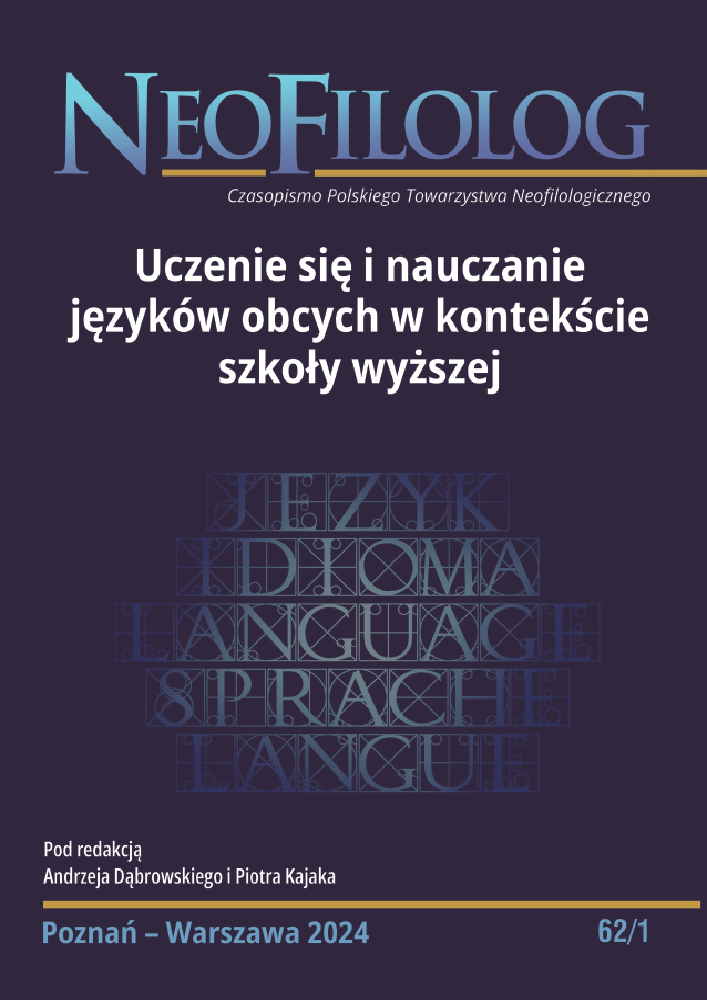Résumé
Self-efficacy is a well-known and researched concept originating from the social-cognitive theory of Albert Bandura (1977, 1997). However, it still seems to be able to promote interesting reflections that are important for language education in higher education, both in teacher and learner activities. According to a number of studies learners acquire important skills and attitudes that are linked to a high degree of self-efficacy: they are highly motivated to learn, set ambitious goals for themselves, and are more persistent and committed to learning than those with a low degree of self-efficacy. The text analyses the results of a quantitative-qualitative study conducted among students participating in foreign language classes at the University of Warsaw. The collected data is analysed with the aim of answering the following research questions: What is the level of self-efficacy in written expression in a foreign language at B2-C2 levels? How do the students perceive the teacher-lecturer’s actions to strengthen their sense of self-efficacy? Do they see strengthening their involvement in written expression as a key element of self-efficacy? In addition, we are also interested in their opinion towards the possibilities of Chat GPT in this regard. The results are used to propose some teaching activities that will enhance students’ self-efficacy in written expression at B2-C2 levels as an important motivational factor which may result in a sense of agency.
Références
Arnett J.J. (2000), Emerging adulthood. A theory of development from the late teens through the twenties. „American Psychologist”, nr 55(5), s. 469–480. DOI: https://doi.org/10.1037//0003-066X.55.5.469
Bandura A. (1977), Self-efficacy. Toward a unifying theory of behavior change. „Psychological Review”, nr 84/2, s.191–215. DOI: https://doi.org/10.1037//0033-295X.84.2.191
Bandura A. (1986), Social Foundations of Thought and Action: A Social Cognitive Theory. Englewood Cliffs. NJ: Prentice-Hall.
Bandura A. (1994), Self-efficacy (w:) V.S. Ramachaudran (red.), „Encyclopedia of human behavior” nr 4, s. 71–81. New York: Academic Press. (Reprinted in H. Friedman [Ed.], Encyclopedia of mental health. San Diego: Academic Press, 1998).
Bandura A. (1997), Self-Efficacy: The Exercise of Control. New York: Freeman.
Chomczyńska-Rubacha M., Rubacha K. (2013), Test poczucia skuteczności. Podręcznik Pracowni Narzędzi Badawczych Komitetu Nauk Pedagogicznych PAN, Warszawa–Toruń: Wydawnictwo Naukowe Uniwersytetu Mikołaja Kopernika. DOI: https://doi.org/10.12775/PBE.2013.007
Graham S. (2022), Self-efficacy and language learning – what it is and what it isn’t. „The Language Learning Journal”, nr 50(2), s. 186–207, DOI: https://doi.org/10.1080/09571736.2022.2045679
Juczyński Z. (2000), Poczucie własnej skuteczności – teoria i pomiar. „Acta Universitatis Lodziensis. Folia Psychologica”, 4, s. 11–23.
Klassen R.M., Tze V.M.C., Betts S.M., Gordon K.A. (2011), Teacher efficacy research 1998–2009: Signs of progress or unfulfilled promise?. „Educational Psychology Review”, nr 23, s. 21–43. https://link.springer.com/article/10.1007/s10648-010-9141-8 [DW 12.06.2023]. DOI: https://doi.org/10.1007/s10648-010-9141-8
Łukasik I.M. (2013), Poczucie własnej skuteczności we współpracy z grupą. Eksperyment pedagogiczny w przestrzeni akademickiej, Lublin: Wydawnictwo Uniwersytetu Marii Curie-Skłodowskiej.
Mills N., Pajares F., Herron C. (2006), A re-evaluation if the role of anxiety: self-efficacy, anxiety and their relation to reading and listening proficiency. „Foreign Language Annals” nr 39 (2), s. 273–292. DOI: https://doi.org/10.1111/j.1944-9720.2006.tb02266.x
Mills N., Pajares F., Herron C. (2007), Self-efficacy of college intermediate French students: relation to achievement and motivation. „Language Learning” nr 57 (3), s. 417–442. DOI: https://doi.org/10.1111/j.1467-9922.2007.00421.x
Oleś P.K. (2005), Wprowadzenie do psychologii osobowości, wyd. 2. Warszawa: Wydawnictwo Naukowe „Scholar”.
Oleś P.K. (2011), Psychologia człowieka dorosłego. Ciągłość – zmiana – integracja. Warszawa: Wydawnictwo Naukowe PWN.
Pajares F. (1996), Self-Efficacy Beliefs in Academic Settings. „American Educational Research Association” nr 66(4), s. 543–578. DOI: https://doi.org/10.3102/00346543066004543
Raoofi S., Tan B.H., Chan S.H. (2012). Self-efficacy in second/foreign language learning contexts. „English Language Teaching” 5, nr 11, s. 60–73. DOI: https://doi.org/10.5539/elt.v5n11p60
Sarzyńska-Mazurek E. (2019), Poczucie własnej skuteczności osób u progu dorosłości. „Edukacja ustawiczna dorosłych”, nr 4, s. 19–28.
Valls M., Bonvin P. (2015), Auto-efficacité des enseignants: quels outils d’évaluation utiliser?. „Mesure et évaluation en éducation”, nr 38(3), s. 1–47. DOI: https://doi.org/10.7202/1036698ar
Wyatt M. (2018), Language Teachers’ Self-efficacy Beliefs: A Review of the Literature (2005–2016). „Australian Journal of Teacher Education”, nr 43, 4, s.92–120. · DOI: https://doi.org/10.14221/ajte.2018v43n4.6
Woodrow L.J. (2006), A model of adaptive langauage learning. „Modern Language Journal” nr 90 (3), s. 297–319. DOI: https://doi.org/10.1111/j.1540-4781.2006.00424.x
Woodrow L.J. (2011), College English writing affect: Self-efficacy and anxiety. „System”, nr 39, s. 510–522. DOI: https://doi.org/10.1016/j.system.2011.10.017
Licence
© Jolanta Sujecka-Zając 2024

Ce travail est disponible sous licence Creative Commons Attribution - Pas de Modification 4.0 International.
Auteurs :
Les auteurs de textes acceptés pour publication dans la revue Neofilolog sont tenus de remplir, signer et renvoyer à l'adresse de la rédaction, un accord sur l'octroi d'une licence gratuite pour les œuvres, avec obligation d'accorder une sous-licence CC.
En vertu de cet accord, les auteurs des textes publiés dans la revue Neofilolog accordent à l'Université Adam Mickiewicz de Poznań une licence non exclusive et gratuite et permettent l'utilisation de la sous-licence Creative Commons Attribution-NoDerivatives 4.0 International (CC BY-ND 4.0).
Les auteurs se réservent le droit de disposer librement de l'œuvre.
Utilisateurs :
Les utilisateurs d'Internet intéressés ont le droit d'utiliser les œuvres publiées à partir de l'année 2017 sous réserve des conditions suivantes :
- reconnaissance de la qualité d'auteur - l'obligation de fournir des informations sur la qualité d'auteur, le titre, la source (liens vers l'œuvre originale, DOI) et la licence, ainsi que l'œuvre distribuée ;
- sans créer d'œuvres dérivées - l'œuvre doit être conservée dans sa forme originale, p. ex. les traductions ou les interprétations ne peuvent être distribuées sans le consentement de l'auteur.
Tous les textes publiés sont soumis au droit d'auteur.
Autres :
L'Université Adam Mickiewicz de Poznań se réserve le droit à la revue dans son ensemble (mise en page, forme graphique, titre, conception de la couverture, logo, etc.).
.

